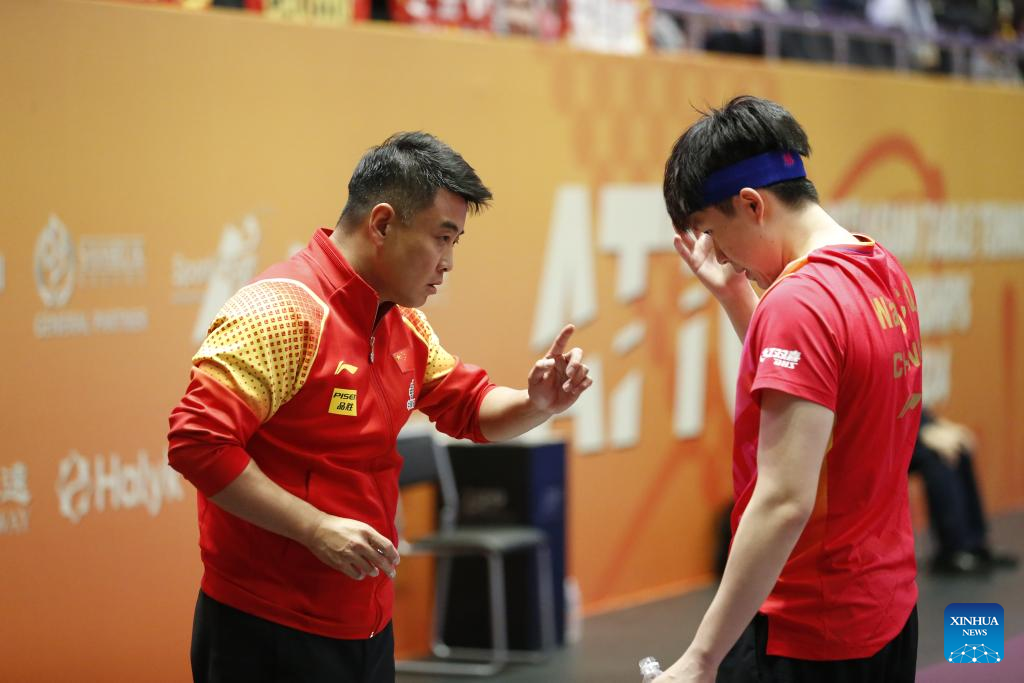
 0 Comment(s)
0 Comment(s) Print
Print E-mail Xinhua, October 15, 2024
E-mail Xinhua, October 15, 2024
China's table tennis players underperformed at the 27th Asian Table Tennis Championships in Astana, Kazakhstan, raising concerns about the team's post-Olympic form.
The Chinese squad secured only two of the seven titles on offer, the fewest they've won in a single championship since their first participation in 1972. This stands in stark contrast to their Paris Olympic dominance, where they swept five gold medals.

Wang Chuqin (R) of China communicates with coach Wang Hao during the men's singles quarterfinal match against Oh Junsung of South Korea at the 27th ITTF-Asian Table Tennis Championships in Astana, Kazakhstan, Oct. 12, 2024. (Photo by Kalizhan Ospanov/Xinhua)
Fitness emerged as a significant challenge for the team. The Chinese players had just finished competing in the World Table Tennis (WTT) China Smash in Beijing before immediately traveling to Astana, with a transfer on the way. They arrived just as the tournament began, leaving them with less than a day to adjust and prepare.
This grueling schedule set the stage for a tough campaign. Still, few could have anticipated how events would unfold.
In this new Olympic cycle, the Chinese team saw changes in its roster. On the women's side, Chen Meng has yet to play a competitive match, and Wang Manyu withdrew from the championships at the last minute due to family issues, leaving only Sun Yingsha to compete in Astana.
However, after playing in three Olympic events and competing in the WTT Champions Macao and China Smash, the top-ranked Sun Yingsha showed signs of fatigue. This was evident during the women's team final against Japan, where she appeared to be struggling, frequently swinging her arm. China lost the match 3-1.
The following day, Sun withdrew from the remaining matches, citing arm muscle issues.
With Sun's withdrawal, the Chinese women's team faltered. No player reached the singles semifinals, and the doubles pair, Chen Xingtong and Kuai Man, were knocked out in the semifinals.
The men's team faced a similar situation. Olympic stalwarts Fan Zhendong and Ma Long were absent, leaving Wang Chuqin, Lin Shidong, and Liang Jingkun to form a new-look squad.
Despite the changes, the men's team delivered a solid performance, defeating Chinese Taipei 3-1 to retain their title. Reflecting on the win, Wang Chuqin said, "A new Olympic cycle, a new team. We achieved a good result in the team event."
However, their momentum didn't last long. Wang exited in the singles quarterfinals, and Lin, despite his strong showing, fell short in the final.
Despite being only 19, Lin was visibly exhausted after a demanding schedule. In the past month, he had won six titles across three WTT tournaments and risen to world No. 3. At the Asian Championships, he competed in four events, playing five matches in a single day.
While physical fatigue partly explains China's underperformance, it rang alarm for the team to focus on talent development to maintain their global dominance.
The Paris Olympics had already hinted at the challenges China faces. Though the men's team defeated Sweden 3-0 in the final, each set went to the limit. Fan Zhendong also faced a grueling singles quarterfinal, narrowly defeating Japan's Tomokazu Harimoto after Wang Chuqin's early exit.
Sustained success in any sport requires consistent team development. China must be prepared for greater challenges in this new Olympic cycle.
Iran's 14-year-old Benyamin Faraji, ranked 210th globally, stunned Wang Chuqin in the team event and pushed Lin Shidong to the brink in the singles round of 64. This serves as a stark reminder that young players from other countries are increasingly capable of challenging China's dominance.
Among China's young talents, only Lin and Kuai Man, who won the mixed doubles title in Astana, have made their mark in international competitions. Other rising stars still need exposure to high-level tournaments to gain experience and mental fortitude.
While one tournament doesn't define the entire sport's landscape, the Asian Championships, as the first major event of the Los Angeles Olympic cycle, should be a clear signal to China: the road ahead is challenging, and staying at the top will require strategic adjustments and renewal.